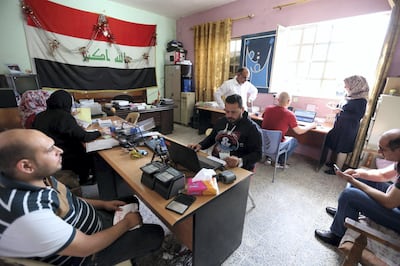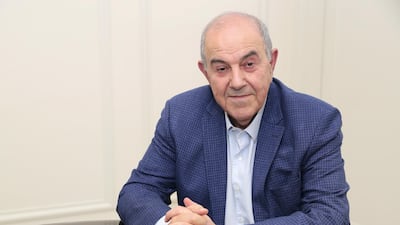Iraq will not solve the crises it faces unless it maintains an inclusive political process, overcomes sectarian divisions and rids itself of foreign interference, the Iraqi Vice President Ayad Allawi told The National during a visit to Dubai.
On the 12th of May Iraqis will cast their votes in the first parliamentary elections since the country's victory over ISIL. However, the state is still being hindered by issues that are debilitating its democratic process and political independence.
Mr Allawi explained that foreign intrusions in Iraq are obstructing efforts to bridge the sectarian divide and stressed that the country's political process must be based on a common national identity.
“We don’t want an election based on sectarianism. We want an inclusive political process," he said. "However, the environment in Iraq is very sectarian, rigid and intimidating, with armed militias on the rise and the disenfranchisement of people continues.”
For years Iraq has been caught up in the region's sectarian divisions. But tensions were further exacerbated when Tehran leveraged its ties with Iraq's Shia majority and emerged as the country's major foreign power broker.
Mr Allawi says he advised the Iranian ambassador in Iraq that he shouldn’t encourage his government to meddle in the country’s internal affairs. “We know that there are senior Iranians based in Iraq that have an internal influence. This is not healthy, I speak to most leaders of the Shiite and Sunni blocs, they don’t want to see any foreign government getting involved.”
In addition to external meddling, Mr Allawi cites problematic institutions, poverty, security and terrorism as key factors behind Iraq's political failure. "There needs to be a rectified process that is not based on decisions taken in Tehran or Washington or anywhere else,” he said.
In the 2010 elections, Mr Allawi won more seats than Nouri Al Maliki - his fiercest competitor and close ally of Iran - but fell short of a majority. He accuses Iran of blocking his bid to become prime minister.
However, added the 73-year-old vice president, he doesn’t “harbour any animosity towards Iran or the neighbouring states” but instead urges the international community to “let Iraqis choose their leaders and representatives.”
Tehran denies any interference in Iraqi politics and says it has only provided military assistance to Shiite paramilitary groups in their fight against ISIL.
But with ISIL defeated , the future role of the militias presents a challenge for the central government, as many Iraqis voice concern over the participation of pro-Iranian movements in the elections.
Mr Allawi pointed out that the militias, also known as Hashed Al Shaabi, present two troubling elements.
One, he explains, is that "they have become a legal entity in the state and the other is the unknown - what they are doing, and the fact that they are intimidating and harassing people.”
_______________
Read more:
Comment: Iraq is still far from establishing peace, stability, democracy and prosperity
Iraq: Abadi’s electoral alliance collapses after just one day
Baghdad set to take Kurdish-controlled borders 'without violence'
_______________
The vice president believes that the failure of Iraq's political process was a consequence of the downfall of Saddam Hussein and the consequent US occupation.
“The state was dismantled, which opened the way for intervention for various countries in Iraq’s affairs then people started to revert back to their tribes, [their] region. Without rectifying this political process Iraq will be a big loser,” he said. Iraqis, he added, are disgusted by sectarianism and the politicising of religion.
Born in 1944 Mr Allawi, a secular Shiite Arab from a prominent family, became the first Iraqi prime minister after the US-led invasion of 2003. He led a coalition government that was committed to a secular future for Iraq.
“We have a lot of sympathy from the Iraqi people because we are non-sectarian,” he said, adding that “the diversity of our population is a source of strength, not a sources of destruction.”
Mr Allawi warned that the prevailing political conditions and the mechanics of the upcoming elections are not conducive to a fair voting system.
“The Independent High Electoral Commission is a repetition of the previous one, it’s based on sectarianism. There are signs that indicate foreign meddling [in the election process] from neighboring countries such Iran and Turkey. This is not in the favor or interest of the Iraqi people,” he explained.
Mr Allawi's bloc has been advocating for fair and transparent elections, following the country ranking 166 out of 176 in the Transparency International's corruption index in 2017.
He also rejected Mr Al Maliki's call for an all-majority government, claiming it would result in a sectarian majority. "Politicians try to camouflage it by saying it’s a political majority, but we all know that its sectarian. We don’t believe in this at all,” he said. "We are not ready for a majority rule government, we need to establish institutions based on non-sectarian policies first."

Another challenge, and perhaps one of Iraq's most pressing issues, is that of corruption.
"Iraq is a very rich nation, unfortunately, according to the UN more than one third of the population lives under the poverty line which is unbelievable," said Mr Allawi. Adding that the only successful way of eradicating corruption is by unifying Iraqis in the building of institutions and the development of the country's economy.
Mr Allawi is pressing to abolish government institutions like the integrity commission, which aims to prevent and investigate corruption, and replace it with an independent audit office.
In 2015, he nominated 40 international companies to conduct forensic auditing but his request was rejected.
Mr Allawi believes that the country's lack of unity also paved the way for the rise of ISIL and warned that the region could continue to see itself affected by both ISIL and sectarianism.
"I advised the central government that we need to pool our intelligence with all countries that enjoy and advocate moderation."
Mr Allawi stressed that if peace is not won then Iraq is bound to lose its battle against the insurgents.
"They will disperse and solidify themselves and this will be added on to Iraq's many problems,” he said.


